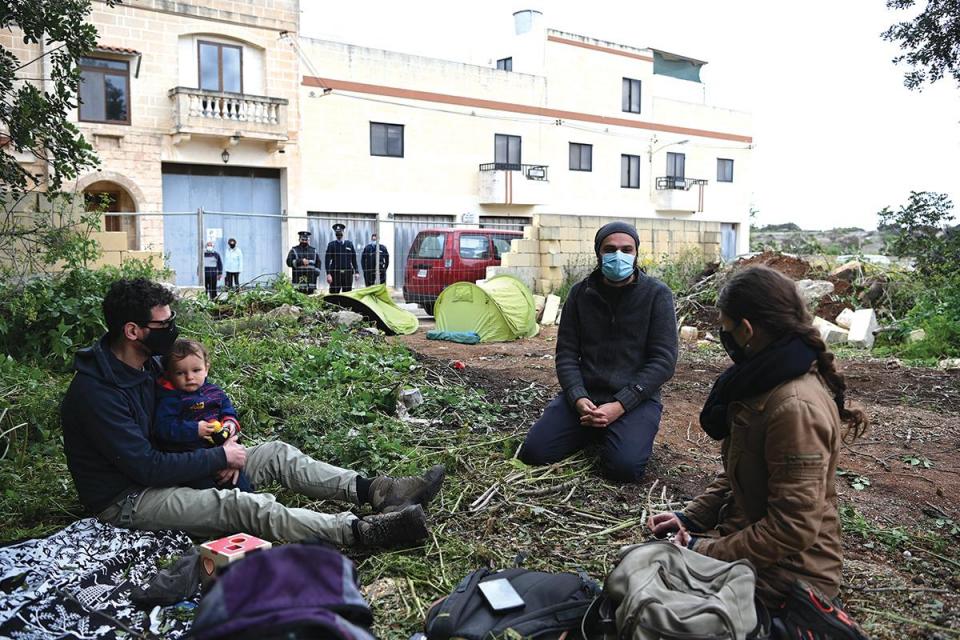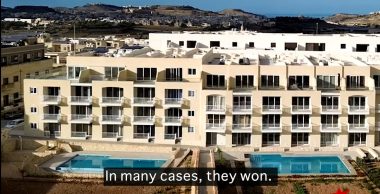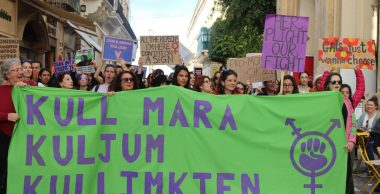Around this time a year ago, shortly after a meeting with residents in the uncertain atmospheres of Mrieħel, a farmer appeared in the doorway with a crate of his own produce, a sincere token of his appreciation.
We would go on to witness similar gestures throughout 2021, another rollercoaster of a year not only for this group but for the country in general.
We had planned a different, probably duller schedule.
But it wasn’t to be. In our world, plans often go out of the window: resistance, often by improvisation, has coloured a large part of the last 12 months.
So, it was heartening to see residents and farmers in Dingli turning up to our three-week resistance camp in March, bearing water, food, vegetables and words of encouragement and appreciation.
It was as comforting as the scores of signatures from residents against the useless road across agricultural land, part of a wider scheme involving a bigwig in the development lobby.
See, Ian Borg tried to claim we wanted attention by “staging an attack on Ian Borg in the hometown of Ian Borg” but it became immediately obvious to him that we have no territorial interest in Dingli or elsewhere, something which “Ian Borg” cannot say about himself in either first or third person.
In fact, despite the road being built, we left Dingli on our terms with landowners finally compensated, having rescued a medieval chapel and saved two ancient trees from his chainsaws.
Right after Dingli, we were fighting off Zammit Tabona’s jetty in Balluta and, once again, the residents’ support was crucial for the resistance.
It eventually paid off, as Fortina announced they’ll be withdrawing their plans.
There were other successes, most of them in the last few weeks, such as the court’s annulment of the Marsascala water polo pitch permit, which brought satisfaction to the tight-knit residents’ community, which is fighting a bigger, newer monster: the marina.
Looking at the widespread anger and opposition to the project, from across the political divide, including Labour’s own rank and file, it is now clear that residents and communities hold the key to the future of their towns.
If it weren’t for their organisation, determination and, yes, fearlessness, the marina would have been a done deal in the dark.
Marsascala has, like Pembroke, confirmed that residents and communities working together can stop massive developments from stealing their quality of life. The key to the resistance is theirs, not ours.
A journalist once asked why we do what we sometimes, reluctantly but efficiently, have to do: direct actions in the cold, rainy weather, surrounded by filthy heavy machinery and intimidating contractors
“We don’t do it for us. It’s about social justice.”
It is this very forgotten concept that has kept Moviment Graffitti active and relevant for 27 years, across different members and generations, new and harder struggles, evolving scenarios and new tactics.
It is our leftist ideology that has kept us consistent and unflinching in our views; those who, even under a previous administration, strived to paint us as misguided hippies or punks, are now those who realise that independent groups such as ours are nowadays more credible than either political party.
Those who like us for our ‘ambjent’ but criticise our stances on civil liberties – from abortion to cannabis – or those who want us to make unholy alliances with the opposition have understood little of what our activism is about.
We’ve been asked, once or twice (and maybe not without a hint of malice), why we’re involved in everything under the sun.
First of all, Moviment Graffitti has never portrayed itself to be something for everyone. The causes we take up are inspired by social justice, which is why we’ve been heavily active in the prisons issue, where 14 inmates left Corradino in a body bag over the last three years.
It is why we have been active in bringing forward the realities faced by many women in our society, from domestic violence to restrictions on their sexual and reproductive health.
It is also why we have engaged with underpaid food couriers, employed in hopeless conditions by companies that think they can make up for greed by splashing money onto CSR.
It is why we have stood by exploited migrants demanding basic decency from society.
It is why we have joined in the anger of Nadur and Qala residents, who are being stripped of their livelihoods after a gross act of episcopal hypocrisy from their spiritual shepherd, Archbishop Charles Scicluna.
It is why we stood by farmers around the island while Fredrick Azzopardi and his suited barbarians flouted laws with their relentless pillage of agricultural land.
It is also why, together with Għaqda Bdiewa Attivi and Malta Youth in Agriculture, we are fighting to avoid the death of the farming sector.
All along, we participated in consultations, parliamentary committees (oh, the joy!) and sat around tables to make our case for a socially just Malta. But all this would be useless without the backing of hundreds of residents across Malta who initiated or joined the struggle.
Their displays of support are encouraging, indeed, heart-warming but not as half as precious as their will to bring the community together to protect their common good.
This holds true now that elections are upon us: we can’t afford to drop our guard as the monsters we’ve stopped for now will rear their ugly head while half the country is still nursing its electoral hangover.
We can’t afford to go it alone either. Social justice flourishes through collective action, not individualism.
Our struggle continues in 2022 but it needs you too. We’re with you.




